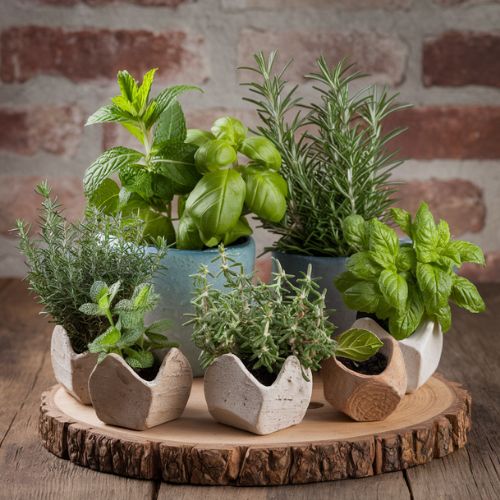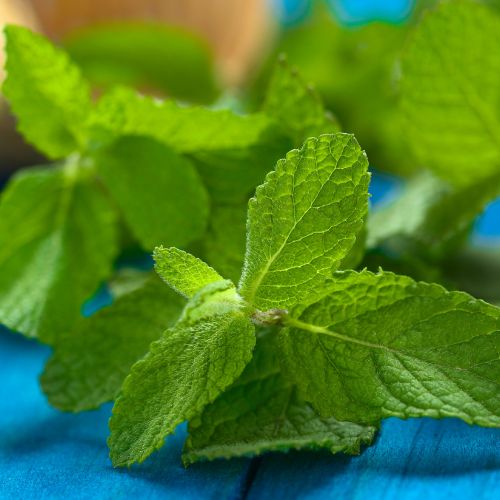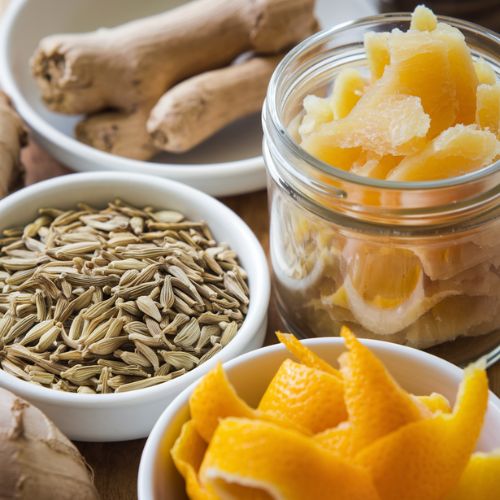Learn About Carminative Herbs
I have come across the phrase “this is a carminative herb” many times in the past and have always wanted to have my own glossary of terms. Instead of just listing them like most books do (usually towards the end of the book together with the index) I’ll write dedicated posts to each term as and when time permits.

Carminative herbs promote digestion, increase appetite, relieve gas as well as cramps. They can also add flavour to meals. Kitchen herbs (oregano, thyme, rosemary, garlic, etc) and indian spices (ginger, cardamom, cinnamon, cumin, etc) would fall under this category (check out my post on the hot essential oils which covers both aromatic herbal essential oils and the spicy essential oils).
When Should we Use Carminative Herbs?
Carminative herbs are best used to help alleviate a variety of digestive issues.
They can be particularly beneficial when you experience any of the following symptoms:
- Painful gas: If you’re feeling discomfort due to trapped gas, carminative herbs like peppermint or fennel can help relax the digestive muscles and allow gas to pass more easily.
- Diarrhea: Herbs such as cinnamon and ginger are known for their ability to soothe the digestive system and reduce diarrhea by calming intestinal spasms and reducing inflammation.
- A full stomach that feels heavy: If your digestion feels slow or you’re experiencing indigestion after a meal, carminative herbs like cumin, anise, and cardamom can stimulate the digestive process and relieve that uncomfortable, heavy feeling.
- Bloating: When your stomach feels distended and bloated, herbs like lemon balm, chamomile, or rosemary can reduce bloating by easing tension in the digestive tract and promoting the release of gas.
- Swollen tongue with a white coating: This may be a sign of poor digestion or an overgrowth of yeast or bacteria in the digestive tract. Carminative herbs like oregano, thyme, or coriander can help restore balance to the gut by addressing the root cause and supporting healthy digestion.
Incorporating these herbs into meals or using them as teas or tinctures can provide relief from these symptoms and promote overall digestive health. Remember, it’s important to address the underlying cause of chronic digestive issues, and if symptoms persist, consulting a healthcare professional is advised.

List of Some Carminative Herbs
Carminative herbs tend to have aromatic volatile oils (think rosemary or sage essential oil, for example). They are great when added to meals.
Hot Spices:
- Ginger (Zingiber officinale)
- Cayenne (Capsicum spp.)
- Cinnamon (Cassia spp.)
- Cumin (Cuminum cyminum)
- Cardamom (Elettaria cardamomum)
- Anise (Pimpinella anisum)
- Clove (Syzygium aromaticum)
- Black Pepper (Piper nigrum)
- Nutmeg (Myristica fragrans)
Aromatic Kitchen Herbs:
- Sage (Salvia officinalis)
- Lavender (Lavandula spp.)
- Basil (Ocimum basilicum)
- Fennel (Foeniculum vulgare)
- Dill (Anethum graveolens)
- Angelica (Angelica archangelica)
- Rosemary (Rosmarinus officinalis)
- Mint (Mentha spp.)
- Peppermint (Mentha × piperita)
- Lemon Balm (Melissa officinalis)
- Chamomile (Matricaria chamomilla)
- Coriander (Coriandrum sativum)
- Thyme (Thymus vulgaris)
- Marjoram (Origanum majorana)
- Oregano (Origanum vulgare)
- Parsley (Petroselinum crispum)
- Bay Leaf (Laurus nobilis)
- Tarragon (Artemisia dracunculus)
Other Carminative Herbs:
- Elecampane (Inula helenium)
- Catnip (Nepeta cataria)
- Hyssop (Hyssopus officinalis)
- Yarrow (Achillea millefolium)
- Celandine (Chelidonium majus)
- Goldenrod (Solidago virgaurea)
These herbs and spices are typically rich in volatile oils and can help to ease digestion, reduce gas, and soothe the stomach. Many are commonly found in both culinary and medicinal uses.
Make Your Own After-Meal Digestive Blend with Just 3 Simple Herbs
(The ingredients section contains affiliate links, which means I may earn a small commission if you purchase through them, at no extra cost to you.)
Have you ever noticed those small, fragrant seeds offered when leaving an Indian restaurant? They’re not just for freshening your breath after a flavourful meal—they’re actually a traditional blend designed to promote digestion. And you can easily make your own version at home with just three simple ingredients!

Ingredients
- Fennel seeds (3 tablespoons) – get it here
- Candied ginger (1 tablespoon) – get it here (mince the ginger into smaller bits)
- Orange peel powder (1 tablespoon) – get it here
Instructions
Simply mix all the ingredients together and enjoy a small spoonful after your meal. The aromatic fennel seeds will help soothe your digestive system, while the ginger works its magic to reduce any bloating or discomfort. The orange peel adds a refreshing citrus twist and boosts the overall digestive benefits.
Not only is this blend delicious, but it’s also an effective way to aid digestion and leave you feeling light and refreshed after eating.
Making your own after-meal digestive blend is not only simple but also a great way to support your digestive health naturally. With just three ingredients—fennel seeds, candied ginger, and orange peel powder—you can create a tasty and effective remedy that helps ease digestion, reduces bloating, and leaves your mouth feeling fresh. Whether you’ve had a big meal or just want to promote overall digestive wellness, this blend is a must-try. Plus, it’s a great alternative to store-bought options filled with unnecessary additives.
Give it a try, and see how it helps you feel more comfortable and satisfied after meals!

Hi Patti,
So happy I found you on Pinterest. I’ve been looking for a natural remedy for gas and bloating, so I am anxious to try out your recipe.
Can these herbs be put in a capsule and taken daily rather than in food or teas? How ofter do you recommend taking it to keep painful bloating at bay?
Thank you in advance.
Hi Lin – so sorry about such late reply, I’ve been swamped with messages! Glad to hear you’re happy you found me on Pinterest, I’m about to start posting again soon as I have a lot of great new content ready for it 🙂 I don’t know about the capsules, I tend to move away from them and try to keep the plant as whole as possible when using them for my health. I have taken herbal tablets, of course, but I always talk to the girls at the health shop about this. I’m very happy nowadays making teas and decocting, so I’m more inclined to not take the tablets if possible. Sorry I couldn’t answer your question and sorry I’m so late at answering altogether!